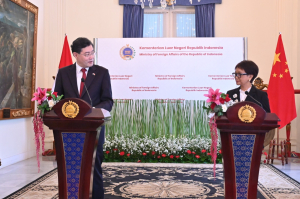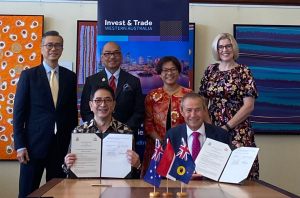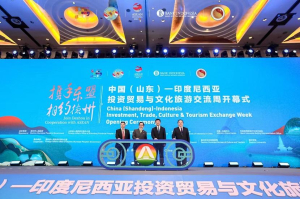BSKLN, UMRAH partnering to optimize foreign policy strategies in the South China Sea
Ministry of Foreign Affairs of The Foreign Policy Strategy Agency (BSKLN) signed an MoU on cooperation with Raja Ali Haji Maritime University (UMRAH), Tanjung Pinang, Riau Islands on March 9, 2023 to optimize the study and development of foreign policy strategies in the South China Sea.
"Through this cooperation MoU it is hoped that BSKLN and UMRAH can support each other in conducting joint research, especially regarding issues that are developing in the South China Sea," said Head of BSKLN Dr. Yayan G.H. Mulayana, as quoted from Kemlu.go.id.
The collaboration aims to re-evaluate the effectiveness of conducting workshops for managing potential conflicts and promoting stability in the South China Sea (SCS), as well as establish a center at UMRAH for studying the SCS, quoted from TribunBatam.id.
The North Natuna Sea Research Center
To put their collaboration into action, the Chief of BSKLN and the Chancellor of UMRAH have reached an agreement to establish two centers at UMRAH, namely the North Natuna Sea Research Center and the South China Sea Study Center.
"This collaboration is considered appropriate considering that UMRAH is in an area directly facing the South China Sea," continued Dr. Yayan, who was also approved by the Chancellor of UMRAH, Prof. Agung Dhamar Syakti.
The agreement between BSKLN and UMRAH was signed during the sidelines of the Focus Group Discussion (FGD) that evaluated the implementation of the Conflict Management Workshop in the South China Sea.
The FGD event took place at UMRAH's Tanjak Room and featured three speakers, namely Dr. Andi Arsana from UGM, Dr. Irman Gusman from UNPAD, and Dr. Sayed Faizan from UMRAH, with Dr. Irman Lanti from UNPAD as the respondent.
UMRAH public lecture
In the workshop, Dr. Yayan delivered a Public Lecture titled "Maritime Dimensions in Indo-Pacific Dynamics" to 180 UMRAH students and academics.
During the lecture, Dr. Yayan emphasized the significance of Indonesia, having a suitable strategy in the Indo-Pacific and establishing a conflict resolution mechanism for a region that is marked by competition between the US and China.
The Indo-Pacific is a potential hotspot, particularly in the South China Sea, the Taiwan Strait, and the Indian Ocean.
More practical cooperation is required
The FGD yielded feedback indicating that the workshop's implementation remains pertinent in managing potential conflicts in the South China Sea.
Nonetheless, the speakers believed that more practical and advantageous cooperation is required for the involved parties, such as utilizing the South China Sea to manage the blue economy, particularly for fisheries.
Additionally, they suggested that wider exposure should be carried out to gain domestic support for the workshop since the program's success is intertwined with public diplomacy.
Furthermore, they deemed it essential to elevate the Workshop into a high-profile collaboration platform.
More about Indonesia’s South China Sea workshop
Indonesia has been organizing workshops on managing potential conflicts in the South China Sea since 1990.
Since the beginning, the SCS Workshop in the 1.5 track format was not intended to resolve all issues in the area but rather to foster a "better atmosphere" and "a sense of community" among all concerned parties.
The SCS Workshop has three primary objectives, including:
- To promote dialogue between parties in the region;
- To establish trust through dialogue; and
- To reduce the parties' reluctance to engage in conflict by fostering concrete cooperation.
Already have an account? Sign In
-
Start reading
Freemium
-
Monthly Subscription
20% OFF$29.75
$37.19/MonthCancel anytime
This offer is open to all new subscribers!
Subscribe now -
Yearly Subscription
33% OFF$228.13
$340.5/YearCancel anytime
This offer is open to all new subscribers!
Subscribe now







